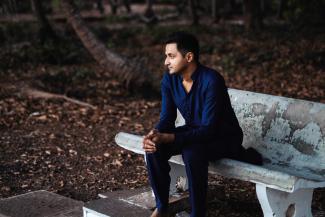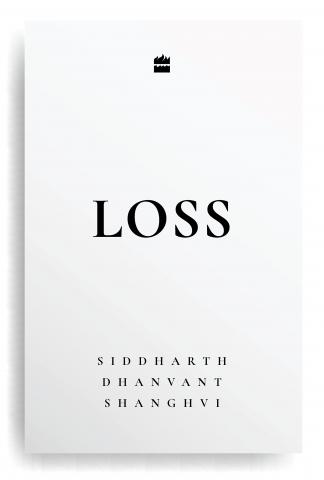
Author Siddharth Dhanvant Shanghvi discusses his latest book ‘Loss’ and examines from up-close mortality, personal grief and achieving equanimity.
Your book ‘Loss’ dwells extensively on the death of your parents, a pet dog and the devastating impact it has on you. What is the most difficult aspect of coping with the loss of a loved one?
The recognition of two deaths. One, of course, is the physical death of the person you have lost. The other is of the person you had become around the person you lost. When we mourn, we should account of the entity we had become around someone - and because of them. There are other things, the conversations, and more often, just the presence, the physical presence – and accepting that you will never encounter this again. After my father passed away I remember sitting with his things – his ties, his lighters, his shirts – feeling subsumed with sadness. These things were around, but he was not. I have never used any of the lovely things but they are with me in a trunk, something to remember him by.
You have mentioned in your book that these personal losses reshape your life. What were the significant changes experienced by you?
The most important thing I can share is this: You will go on. Yes, of course, we are forever marked by what we have lived through, we will never be the same again. But the arrival of grief is defined by cold, endless, stifling despair; the fear that we will not be able to move through grief is, in fact, the essential nature of grief. I came to think of grief as the thing that stilled me until I could recognise and absorb its virtue. It’s not easy but then no death is a party.
How do you erect a column of hope and strength at these vulnerable moments? What did you do to heal and rebuild your life?
I am suspicious of the word ‘heal’ – it seems to imply that grief is a wound. Or it means that healing has finality – that there is a magical line we cross and somehow go past our suffering. I believe we learn to live with our sorrow one day at a time, it’s just that perhaps with time we dial down the volume on our suffering, every day the sadness becomes a little bit softer. No one will tell you that grief is also an aperture for transformation perhaps because it never feels like that at onset.
Many things helped me live with hope, but most specifically, my evolving relationship with nature; and prayer. Both were free, did not rely on family or friends, and both made me see that the thing that follows grief is freedom. Those of us who live in big cities, as I once did, are handicapped by our inability to engage more meaningfully with nature. More than any friend, or book, what helped me were long walks in the fields near my cottage in rural Goa. I cannot recommend walking enough, or swimming at sea, or prayer – do what you need to see yourself through. Eat pizza. Lie on your bed for hours. Move away from the people who ask you to move on.
Did you ever attend some therapy sessions to reconcile with your grief and bereavement?
No, I did not, but I believe one should do everything in their power to reach a point of equanimity. Therapy is an excellent recourse.
I remember a line from ‘Loss’ - ‘Everything in life is only preparation for death’. How does one prepare for illness and death?
I loathe being prescriptive but one thing my sisters and I learned from caring for our father, after his brain cancer, was the recurring question: When is it a good time to leave? It’s a bit controversial to suggest that just because you can extend your life does not mean that you always should. And yet, when you are handed a serious diagnosis, there are valid questions, such as if the treatment of the condition were so harsh that it would disable your pleasure of life, would it be worth pursuing? We place an emphasis on living long – indeed, the famous blessing Ayushmaan Bhava – but there is not much importance given to living deeply, no matter life’s duration.
Your mother was diagnosed with rheumatoid arthritis and was bedridden in her later years. Could you recall her journey and struggles?
While she lived with chronic pain for over thirty years, what I remember most was her ability to make the everyday a cause of pleasure, an invitation to life’s innumerable pleasures. I could talk about how she endured her knee replacements and then her hips, I could talk about how she was unable to walk for almost twenty years of her life - pain was the defining truth of her life. But I prefer to think that she wrote poetry, she cooked soup for her friends, she was an excellent, vivid conversationalist – this is not to minimise her suffering, or her genius to bear it, but to remind myself that she was more than the sum of her anguishes. Her strength came from her acceptance of her condition - her acceptance that she might never reverse her condition.

In 2017, your father passed away due to lymphoma of the brain. What according to you is the hardest part of accepting a diagnosis of cancer?
My father did not pass away from lymphoma of the brain although that was the cancer he endured and defeated. He passed away in his sleep from a heart attack, nine years after the initial cancer diagnosis. The hardest part of a cancer diagnosis is the fallible fear that it is here to destroy you. My father had an excellent oncologist, Dr Asha Kapadia, who insured that his cancer did not recur. My friend Lisa Ray recovered from multiple myeloma, and is a case study in how to deal with cancer; her memoir, Close to the Bone, is excellent.
You pet dog, Bruschetta, whom you considered your ‘accidental muse’ had developed lung cancer and had to be euthanized. Do you believe in euthanasia? Do you think it should be available to people who are terminally ill?
Yes, I do, although the decision requires consideration, it must be examined deeply, with clarity; it should never be a recourse manifest out of either desperation or misinformation. In the case of Bruschetta, she was not able to breathe, so the choice was to let her slowly choke to her death - or to put her out of her suffering. So here I believe the answer was clear. Each case is different and independent, but the right to die is a worthwhile debate.
What are the myths and misunderstandings about grief and death?
The myth is that we must all ‘heal’ - this slightly American idea that we must heal and recover and move on. Yes, that is ideal but it doesn’t always happen. That is also a valid reality for many. And recovery from grief is not a competition – it is a slow, uneven, gradual acceptance of what has gone, and what remains. I also feel that if you can consider death as one would all the important questions of life – about love or sorrow or pain – then the shock of its arrival is clarified by its consideration. The Tibetan Book of the Dead urges you to consider your death until it becomes a kind of preparation, a riyaaz. Who knows what follows death but to have lived at all is such an absurd privilege. So, live.
If you had to shortlist 3 books on death and bereavement that has left a deep impact on you, which one would they be?
- The Year of Magical Thinking - Joan Didion
- The Other Side of Sadness – George Bonanno
- When Breath Becomes Air – Paul Kalanithi






